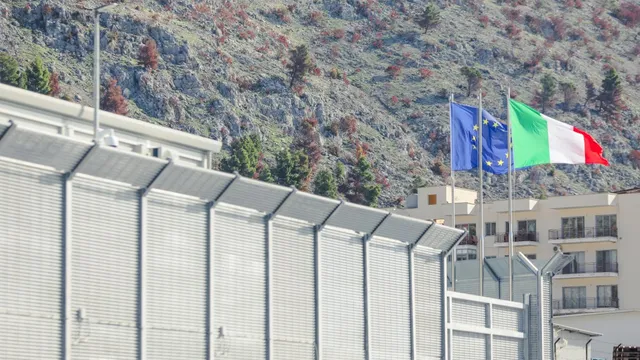
Italy's migrant centres in Albania: a solution to illegal migration?
2024-10-15 10:46- Italy has established a new migrant processing centre in Gjader, Albania, to manage illegal migration.
- The facility is designed to accommodate men in prefabricated containers and includes basic amenities.
- This initiative is part of a €670 million operation, with European leaders closely monitoring its effectiveness.
Express your sentiment!
Insights
In Albania, Italy has established a new migrant processing centre in Gjader, aimed at managing illegal migration. The facility is surrounded by a 20ft-high metal fence and is designed to accommodate men who have been intercepted at sea. Each individual will receive a regulation sweatshirt and will sleep in prefabricated containers equipped with USB plugs for their phones. The outdoor area features a small courtyard painted lime green, intended to create a calming environment for the migrants. The first group of migrants is expected to arrive soon, as the Italian navy patrol ship Libra has already begun transporting individuals to the centre. This initiative is part of a €670 million operation that Italy hopes will effectively address the ongoing challenges of illegal migration, with significant attention from other European leaders on its success or failure. The centre's design and operational approach reflect Italy's commitment to managing migration while also providing a semblance of comfort for those detained.
Contexts
In a controversial move, Italy has established migrant processing centers in Albania, a decision that has drawn criticism from human rights groups and sparked debate across Europe. Under the agreement, up to 3,000 men per month will be transported to these centers while their asylum requests are processed in Italy. Women, children, and vulnerable individuals will still be taken directly to Italy, but the fate of many men now hangs in the balance as they await decisions on their claims. Critics argue that this plan aims to deter migration rather than provide genuine support for those seeking refuge. The Italian government, led by Prime Minister Giorgia Meloni, has framed the initiative as a necessary step to combat human trafficking and manage the migration crisis more effectively. However, the European Court of Justice has ruled that Italy's plan to offshore migrants to non-EU countries is illegal, raising questions about the legality and ethics of the agreement. The UN refugee agency has expressed serious concerns and will monitor the centers, but the lack of a start date for operations leaves many uncertainties. As the centers prepare to open, they will initially accommodate 880 men, with plans to expand to 3,800. Those whose asylum claims are accepted will be allowed to enter Italy, while others face deportation to countries deemed 'safe' by Italian authorities. The agreement has been described as a 'shameful' tactic by organizations like Amnesty International, which warn that it could lead to prolonged detention and hinder the right to seek asylum. Despite the backlash, Meloni's administration continues to promote the Albania deal as a model for European cooperation on migration. With the backing of the EU and interest from other nations, including the UK, the future of this initiative remains a focal point in the ongoing struggle to address migration in Europe.